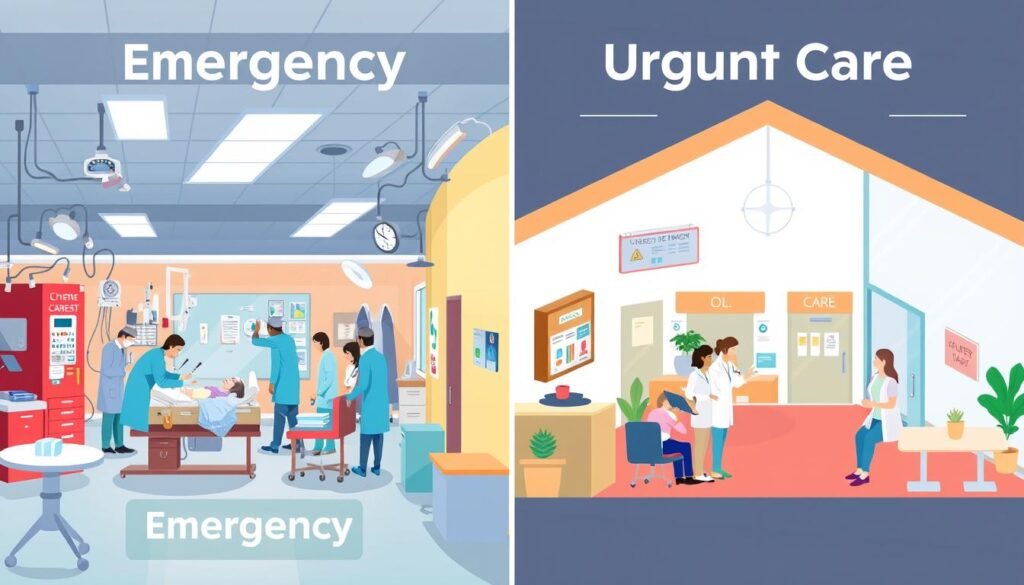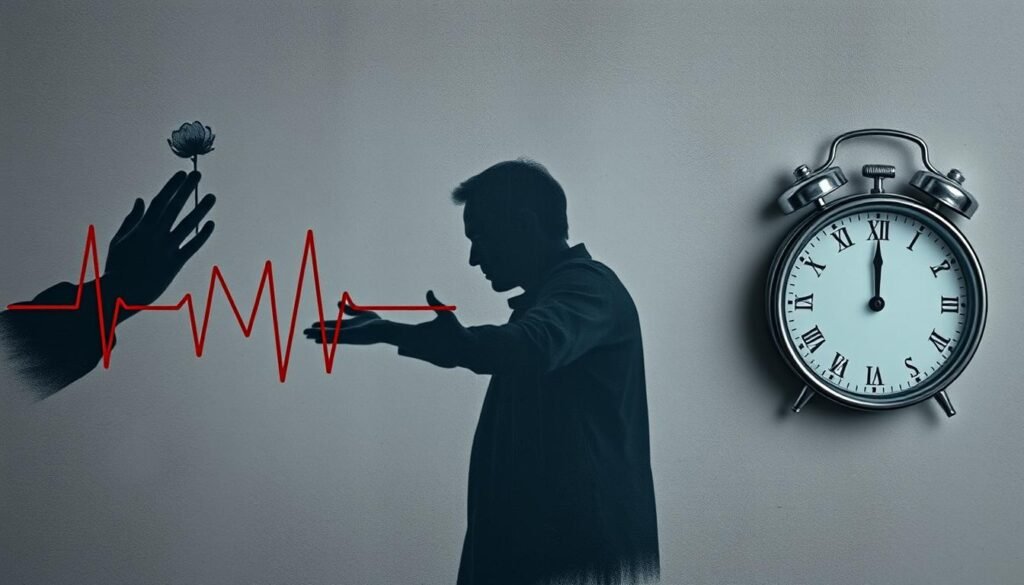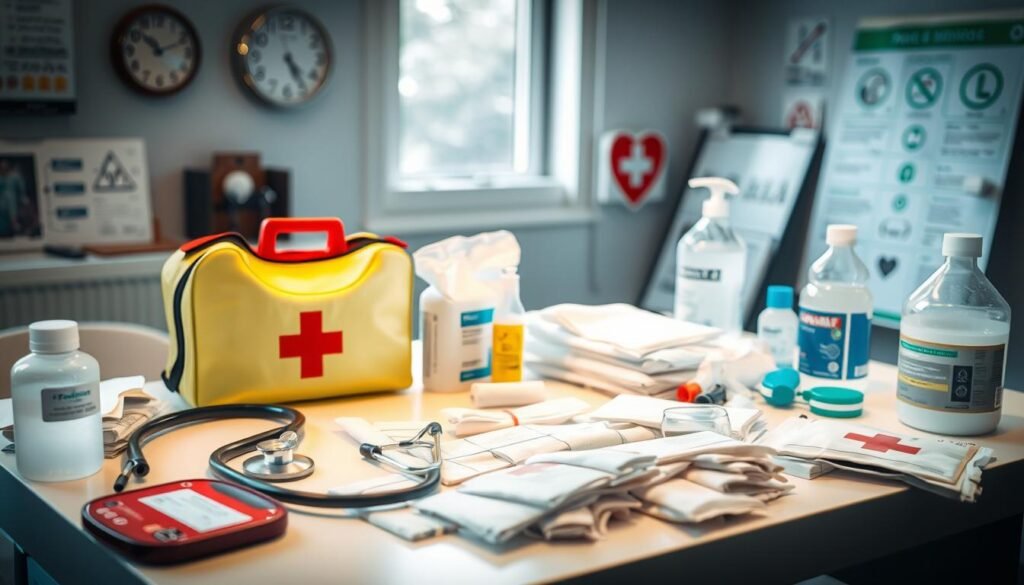Did you know only 1 in 16 people really understand the importance of recognizing dangerous situations? This fact highlights how crucial it is to keep an eye on health issues. With flu season approaching, being able to tell apart the common cold from serious warning signs is key. The CDC says that knowing when to seek help can greatly improve health outcomes. Being aware of these signs can literally save someone’s life.
Key Takeaways
- Understanding critical warning signs can help in quickly assessing health conditions.
- Only a small percentage of individuals recognize their ability to observe dangerous symptoms.
- Chest pain lasting more than a few minutes requires a call to 911.
- Fevers in infants and young children can indicate serious health threats.
- Unexpected changes in health, such as significant weight loss, need medical attention.
- Recognizing symptoms of potential strokes is vital for effective responses.
Understanding Medical Emergencies
Knowing what medical emergencies are is key. They need quick action to stop health issues from getting worse. Knowing the different kinds lets people act fast and might save lives.
Defining Medical Emergencies
A medical emergency is when someone’s health or life is in danger. Things like lasting chest pain, hard breathing, or lots of bleeding are emergencies. In these moments, it’s tough to think straight. That’s why being ready for emergencies is crucial.
Common Types of Medical Emergencies
We face many kinds of emergencies. Some include:
- Bad injuries from accidents
- Hard time breathing or choking
- Chest pain, which could mean heart issues
- Heavy bleeding
- Mental health emergencies, like trying to harm oneself
Knowing about these emergencies helps in reacting quickly. For kids, signs like big changes in how they act, throwing up after hitting their head, or seizures mean it’s serious. It’s important to have emergency numbers ready, know where your closest emergency room is, and know when to dial 911 for serious conditions.
When to Seek Medical Help: Recognizing Warning Signs
Knowing when to get medical help is key for everyone. Many symptoms call for quick action, from physical to mental health issues. Catching these signs early can improve health quickly.
Symptoms Requiring Medical Attention in Adults
Adults must watch for signs that need medical check-ups right away. Important symptoms include:
- Persistent chest pain or discomfort, might mean a heart attack.
- Difficulty breathing, could be a sign of breathing or heart problems.
- Sudden confusion or feeling lost, warning of a possible stroke.
- Severe pain that doesn’t go away, especially in chest or belly.
Heart issues might show up as nausea or feeling dizzy. Getting help fast can reduce heart damage. Also, noticing stroke signs early can avoid worse health issues later. For asthma or breathing troubles, don’t ignore severe shortness of breath or wheezing. These need quick doctor visits.
Symptoms Requiring Medical Attention in Children
Spotting emergency signs in kids can lead to fast help. Look out for:
- Fast or troubled breathing, could mean breathing problems.
- Severe vomiting, might cause dehydration or worse.
- Bluish skin, around lips or face, signals lack of oxygen.
Changes in how kids act can show mental health issues too. Often scared, very anxious, or dropping grades might need looking into. Help is out there, like this guide on mental health signs. Knowing what to watch for helps parents get the right support.
Emergency Care vs. Urgent Care: What’s the Difference?
Knowing when to choose emergency care or urgent care is key. Each has its role based on the health issue’s severity. It’s crucial to know which to go to for fast and right medical help.
Understanding Emergency Care Services
Emergency care is for very serious, life-threatening issues. It’s open all day, every day. People go there for things like:
- Chest pain
- Difficulty breathing
- Loss of consciousness
- Serious trauma and severe burns
- Uncontrollable bleeding
- Signs of a heart attack or stroke
In emergency services, experts are ready to give complex, urgent care. But, it’s often pricier than urgent care. This can make insurance matters tricky.
Determining When to Use Urgent Care
Urgent care is for less severe issues that still need quick attention. These clinics are open late and on weekends. They deal with things like:
- Colds and flu symptoms
- Minor injuries
- Animal or insect bites
- Minor fractures and strains
- Fever without a rash
- Vomiting and abdominal pain
Urgent care centers usually have shorter waits. They also offer X-rays, lab tests, and vaccines on-site.
| Feature | Emergency Care | Urgent Care |
|---|---|---|
| Operating Hours | 24/7 | Evenings and Weekends |
| Cost | Higher | Lower |
| Typical Conditions | Life-threatening emergencies | Non-life-threatening injuries and illnesses |
| Wait Times | Longer | Shorter |
| Insurance Coverage | More complicated | Usually straightforward copays |

In short, knowing when to seek emergency care or urgent care is vital. Making the right choice can lead to better health management.
Serious Illness Signs to Look Out For
It’s key to know signs of serious illnesses for quick help. Some symptoms mean you should act fast. This know-how could save a life.
Persistent High Fever
A high fever, especially over 103°F, is a danger sign. It may show infections or diseases that need quick doctor’s care. If a fever lasts more than three days or comes back often, tell a doctor.
Unexplained Weight Loss
Losing a lot of weight fast without trying is a warning. It may point to diabetes, cancer, or stomach issues. Seeing a doctor for advice and tests is crucial.
Severe Pain in the Chest or Abdomen
Never ignore bad chest or stomach pain. It could mean heart issues or deep injuries. Get help right away to check for serious problems and get treated.

Injury Treatment: Knowing When to See a Doctor
It’s key to know when you’re injured and need help. Getting care quickly can help you heal faster without long-term problems. This section talks about which injuries need quick action. It also covers signs that tell you an injury is serious.
Common Injuries that Require Immediate Attention
Some injuries can’t wait. These include broken bones, dislocations, and major ligament tears. Deep cuts that bleed a lot are also emergencies. Kids playing one sport a lot can get hurt from overdoing it. This can lead to injuries from using the same muscles too much.
For quick help at home, remember RICE: Rest, Ice, Compression, Elevation. This method helps lessen pain and swelling till you can see a doctor. But remember, it’s just the first step.
Symptoms that Indicate Serious Injuries
If you’re hurt and feeling really bad pain that won’t go away, see a doctor. Numbness, weakness, or a tingly feeling also means you need help right away. Big swelling, lots of bruises, or if it feels like something’s out of place are also red flags.
It’s a good rule to get checked by a doctor within 24 to 48 hours of getting hurt. Even if it doesn’t seem serious at first. Doing this can help stop worse problems later. And it makes sure you’re treated for things like broken bones or muscle damage. Knowing when to see a doctor can save you from long-term pain. Quick action often leads to better healing.

Preventive Healthcare: The Importance of Regular Check-ups
A proactive approach to health through preventive healthcare can lower the risk of medical surprises. Regular check-ups play a key role in finding health issues early, helping people stay at their best. At these visits, doctors look at your overall health, find problems early, and promote health awareness.
How Regular Visits Can Prevent Emergencies
Having an annual wellness exam is a great chance to keep an eye on your health. Early stages of issues like high blood pressure, diabetes, and some cancers don’t show symptoms. That’s why regular check-ups are crucial. They include important tests for early detection.
For those with ongoing health concerns, these visits are a time to see if treatments are working and make changes if needed. Staying up-to-date with vaccinations and screenings for diseases is also a focus, making sure everyone is protected.
Recognizing Subtle Signs Before They Escalate
Small changes in health might not get the attention they need. Regular check-ups help catch these signs early. Doctors keep an eye on vital signs, like heart rate and blood pressure. This helps find issues before they become big problems.
Tests like blood glucose checks and cancer screenings find diseases early. This makes treatment more likely to succeed. Focusing on preventive care boosts your chances for better health outcomes.
| Health Condition | Screening/Test Frequency | Age Group |
|---|---|---|
| Blood Pressure | Every 1-2 years | Adults 18-64 |
| Diabetes | Every 3 years if at risk | Adults 45+ |
| Mammograms | Every 1-2 years | Women 40+ |
| Colonoscopy | Every 10 years | Adults 45+ |
| Prostate Cancer Screening | Discuss with doctor | Men 50+ |
| Bone Density Test | Every 2 years | Seniors 65+ |
Professional Medical Advice: Trusting Your Instincts
Understanding how intuition and analytical thinking play together helps us grasp health issues better. It’s crucial to trust your instincts if you think something’s wrong with your health. If uncertain symptoms arise, getting professional medical advice is key. Patients are urged to consult a doctor if they’re worried about their health.
When to Reach Out for Clarification from a Doctor
Many hesitate to contact their doctor over small concerns. But if you have a gut feeling about a symptom, it’s important to trust it. If you feel uneasy or confused about a symptom, seeing a doctor can clear doubts. It can also uncover any deeper issues. Whether it’s fleeting symptoms or ongoing worries, getting help early can bring relief and the right treatment.
Following Up on Uncertain Symptoms
Health is complex, with many subtle signs to watch for. Patients should note uncertain symptoms that could hint at serious issues. Sharing these observations with your doctor adds to your health history. Acting on instinct about these signs can help catch issues early, leading to better health management.
Common Misconceptions About Seeking Medical Help
Many people think you only need the doctor for serious symptoms. This is not true and can be harmful. It’s important to understand these wrong ideas for better health.
Understanding the Myths Around Doctor Visits
There are many wrong beliefs about visiting the doctor. These include:
- Thinking you’re healthy just because you feel fine.
- Believing only young people need check-ups.
- Thinking health problems will go away by themselves.
- Assuming doctor visits are only for severe discomfort.
These incorrect views can lead to risky situations. For example, not paying attention to small symptoms can cause big health problems. Knowing the truth is key to fighting these myths.
Why Ignoring Symptoms Can Be Dangerous
Not paying attention to symptoms is risky. Symptoms you should watch include:
- Persistent pain
- Unexplained weight loss
- Continuous fatigue
- Changes in mood or behavior
Ignoring these can make things worse. Getting help early can make treatments work better and improve life.
Realizing the value of early doctor visits can change your life. Each appointment helps you understand and look after your health better.
| Symptom | Danger of Ignoring | Recommended Action |
|---|---|---|
| Persistent Pain | Potential indication of serious illness | Consult a doctor for evaluation |
| Unexplained Weight Loss | Could signal underlying health conditions | Schedule a medical appointment |
| Continuous Fatigue | May be symptomatic of various disorders | Seek medical assessment |
| Changes in Mood | Possible sign of mental health issues | Talk to a healthcare professional |
Conclusion
Knowing when to get medical help is very important for staying healthy. It’s key to spot the signs that mean you need urgent care. If you see symptoms of a serious condition, don’t wait too long to get help.
Some people don’t get medical care when they need it. They might not think it’s important, or they can’t easily get to a doctor. Studies, like those looking at ways to get better care in doctor’s offices, show why it’s crucial to seek help. To learn why people might skip going to the doctor, check out this important study.
Getting help quickly can improve your health a lot. Being aware of the signs that you need a doctor helps you make smart health choices. This not only helps you but also keeps our healthcare systems running well. It means people get the care they need when it really matters.